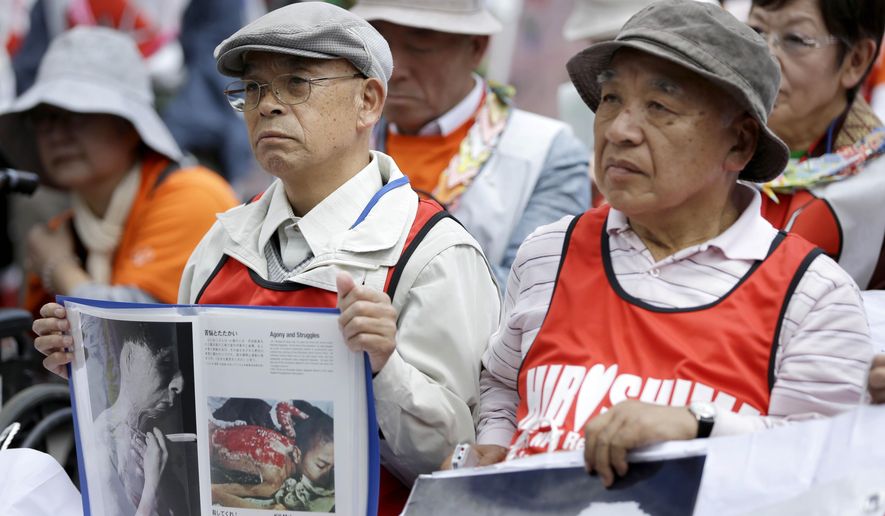HIROSHIMA, Japan | The splash of light was brighter than the sun.
Hiromi Hasai says he survived because he was about 9 miles outside downtown when the mushroom cloud rose over this city on Aug. 6, 1945. He was 14 but still can feel the searing wind that came after the initial flash of light.
“I was very surprised because the sun was already warm, but this was much warmer,” he said. “A little bit later, the glass windows of the building started to shake.”
“Everyone thought it might be an air raid,” Mr. Hasai told The Washington Times. “I looked at the sky, but there were no planes.”
What followed was Armageddon-like chaos. Children and adults moved in a panic toward a wooded hillside beyond the city’s outskirts.
“People didn’t know what was happening,” said Mr. Hasai, who recalled how hours passed before the group he was with began making its way back down from the wooded hillside that afternoon.
SEE ALSO: Japan debates constitution’s military passivism
Burned people, many still alive, were arriving by the truckload from Hiroshima’s center.
“When I went to the trucks to help, I saw most people with melted faces and bodies,” said Mr. Hasai. “They were moving like ghosts. I couldn’t see real humans. I tried to help carry people from the trucks, but people had no skin.
“Their nerve systems had melted,” he said, recalling a horrific first night spent in an auditorium jammed with wailing victims. “All were pleading for a sip of water, but there was a rumor if we gave them water, they might die.
“The next morning, everyone in that auditorium had died,” he said. “I’m very sorry we didn’t give them water. It’s a nightmare I still have. I wish I could have helped those people. Maybe they would have lived if we gave them water.”
Remorse courses through the elderly survivors of the American bombs that killed nearly a quarter-million people in Hiroshima and Nagasaki — airstrikes that ended World War II. U.S. and Japanese leaders have long wrestled with the notion that for all those killed, many thousands were saved by the swift halt to humanity’s bloodiest war.
But the memories remain potent. And now, as the world reels from North Korea’s nuclear posturing, survivors hope young and old will remember the commitment to peace that followed the hypermilitarized mania of imperial Japan — and the American bombs that crushed it.
Keiko Ogura was 8 when the bomb dropped on Hiroshima. She cringes at talk among some of today’s leaders that Japan should prepare itself militarily against the North Korean threat.
“Donald Trump has said to Japan, ’Why don’t you make nuclear weapons yourself?’” Mrs. Ogura told The Times. “I was frozen by that.”
Japan must “hold on to [its] pacifist core,” she said. What is “crazy” today, she added, is how the brainwashing of North Koreans and their idolatry of dictator Kim Jong-un could be compared to the single-minded militarism in Japan before World War II.
Mrs. Ogura grimaced at the thought of where it could lead. She recalled how Japanese children followed orders during the war. By 1945, many were sent to pick apart wooden houses in Hiroshima to reduce the risk of a block-by-block spread of flames should the Americans firebomb the city.
Mr. Hasai was with a group sent outside the city to work at a weapons factory. It was there where he was exercising with other teens outside the building when the bright light flashed on Aug. 6.
“My fear is people will forget the imperialist past,” he said. “The young don’t know the background. They think it’s like a game on a computer. It’s very dangerous if you think of war like a computer game. Japan should be a peaceful country.”
It’s a message that students at Hiroshima’s Jogakuin Senior High School say they are committed to spreading.
“If people remember what happened in Hiroshima and Nagasaki — if they know how horrible it was — they will think nuclear weapons are bad and won’t want to use nuclear weapons ever again,” said 18-year-old student Kyoko. “Japan should not have nuclear weapons. Japan is the only country that was ever attacked by nuclear bombs. Japan should lead other countries to not have nuclear weapons.”
• Guy Taylor can be reached at gtaylor@washingtontimes.com.




Please read our comment policy before commenting.